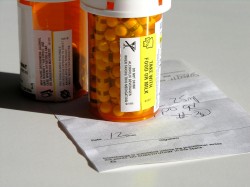Prescriptions
Addiction to prescription medication is a growing concern. Due to the availability of prescription drugs and the increased number of patients doctors need to manage, the risk of developing an addiction is more likely. Youths and young adults are also turning to prescription drugs for a feeling of euphoria because it is easy to obtain from medicine cabinets or complaints to medical doctors. Learning about the different addictions, reasons prescriptions are used and the treatment options will help when a loved one is showing signs of a developing addiction.
Reasons Prescriptions are Abused
Developing an addiction to prescription drugs is not as easy to understand as an addiction to street drugs. Many individuals can become addicted even when the drugs are taken as directed for the prescribed purpose, so it is important to understand the possible reasons an addiction might develop.
A common reason for an addiction to prescription drugs is the strength of new medications. Many prescriptions are getting stronger, which can result in addiction when the drugs are used for a specific medical purpose.

There are different reasons why prescriptions are abused. When abused, there is a high chance of addiction to develop.
Doctors are also facing more patients and less time with each individual. As a result, doctors are not able to research the potential for a developing addiction when prescribing medications based on patient symptoms. Some medical professionals are not considering the possibilities of addiction or might not take appropriate measures to reduce the risk of an addiction.
Improving education among the general population about prescription drugs also plays a role in growing rates of medication addictions. Patients explain their symptoms and ask about a specific medication, which results in obtaining the drug since it is appropriate for the symptoms. Unfortunately, patients do not always consider the possibility of addiction when seeking relief from discomfort, chronic pain or other issues that might arise.
In the case of young adults, youths and recreational use, the drugs are often selected due to the easy access. Since the prescriptions are commonly given to older adults or even young individuals after an injury, gaining access to the drugs is as simple as asking a friend or looking in a parent’s medicine cabinet.
Due to the high rate of addiction, both on accident and on purpose, prescriptions are among the top three problems for the development of an addiction. It is topped only by alcohol and marijuana.
Common Types of Addictions
Although any prescription drug with addictive qualities can become a problem, three types are the most common.
Pain relieving medications are the most commonly abused prescription. Depending on the situation, the addiction might develop on accident due to a legitimate discomfort, injury or chronic condition. Other individuals will begin taking the drugs as an experiment due to the availability. The pain killers are commonly given to patients for various types of discomfort.
Although anxiety medications are gradually reducing in addictive qualities, the benzodiazepines are still addictive. The drugs are commonly given when patients complain of anxiety or describe symptoms that point to anxiety disorders. Unfortunately, valium and similar types of anxiety drugs have addictive properties. While the anxiety medications are a potentially addictive drug, newer medications are non-addictive and many doctors are making an effort to limit the patients on addictive options.
Stimulants are less commonly used or abused, but can develop into a problem when patients are facing certain mental health conditions. The drugs are typically given for problems like hyperactivity disorders, but some individuals with hyperactivity mental health conditions will become addicted to the relaxing impact it provides.
Treatment
The best treatment solution for an addiction to prescription medications will vary. Since many individuals begin taking the drug for legitimate and legal reasons, the appropriate way to handle the addiction differs.
A treatment facility can help by creating a personalized plan based on the situation. As a result, innocent individuals with an injury will have a different approach to treating the problem than the purposeful use of drugs for recreation. Regardless of the situation, all programs will start with removing the drug from the system and then treating the psychological dependence that developed while taking the drug.
Fighting an addiction to prescription drugs is challenging. Although it can present a difficult situation, many individuals can overcome the drugs with a little help from professionals.








